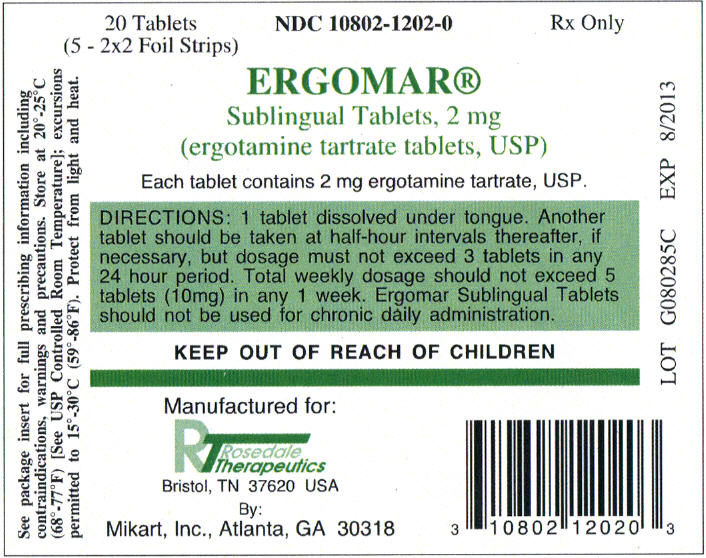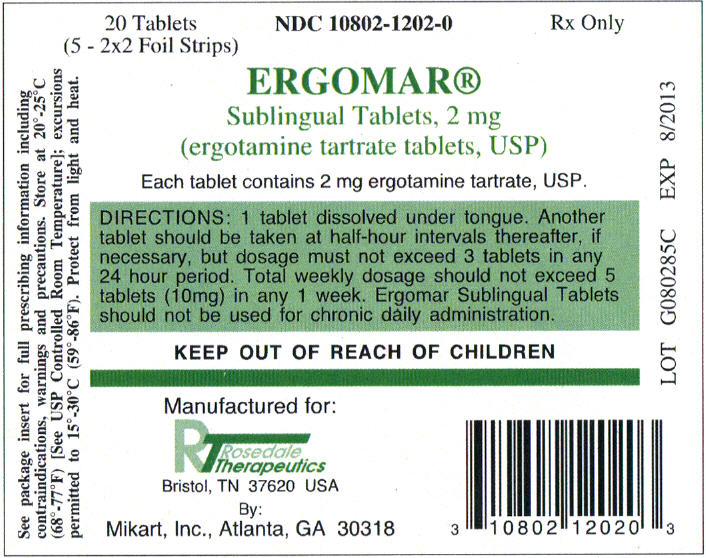Label: ERGOMAR- ergotamine tartrate tablet, orally disintegrating
-
Contains inactivated NDC Code(s)
NDC Code(s): 10802-1202-0, 10802-1202-3 - Packager: Rosedale Therapeutics
- Category: HUMAN PRESCRIPTION DRUG LABEL
- DEA Schedule: None
- Marketing Status: Abbreviated New Drug Application
Drug Label Information
Updated September 8, 2012
If you are a consumer or patient please visit this version.
- Download DRUG LABEL INFO: PDF XML
- Official Label (Printer Friendly)
- SPL UNCLASSIFIED SECTION
-
BOXED WARNING
(What is this?)
WARNING
Serious and/or life-threatening peripheral ischemia has been associated with the coadministration of ergotamine tartrate with potent CYP 3A4 inhibitors including protease inhibitors and macrolide antibiotics. Because CYP 3A4 inhibition elevates the serum levels of ergotamine tartrate, the risk for vasospasm leading to cerebral ischemia and/or ischemia of the extremities is increased. Hence, concomitant use of these medications is contraindicated. (See also CONTRAINDICATIONS and WARNINGS section)
- DESCRIPTION
-
CLINICAL PHARMACOLOGY
Ergotamine is a alpha adrenergic blocking agent with a direct stimulating effect on the smooth muscle of peripheral and cranial blood vessels and produces depression of central vasomotor centers. The compound also has the properties of serotonin antagonism. In comparison to hydrogenated ergotamine, the adrenergic blocking actions are less pronounced and vasoconstrictive actions are greater.
Pharmacokinetics
Interactions
Pharmacokinetic interactions (increased blood levels of ergotamine) have been reported in patients treated orally with ergotamine and macrolide antibiotics (e.g., troleandomycin, clarithromycin, erythromycin), and in patients treated orally with ergotamine and protease inhibitors (e.g. ritonavir) presumably due to inhibition of cytochrome P450 3A metabolism of ergotamine (See CONTRAINDICATIONS). Ergotamine has also been shown to be an inhibitor of cytochrome P450 3A catalyzed reactions. No pharmacokinetic interactions involving other cytochrome P450 isoenzymes are known.
- INDICATIONS AND USAGE
-
CONTRAINDICATIONS
Coadministration of ergotamine with potent CYP 3A4 inhibitors (ritonavir, nelfinavir, indinavir, erythromycin, clarithromycin and troleandomycin) has been associated with acute ergot toxicity (ergotism) characterized by vasospasm and ischemia of the extremities (See PRECAUTIONS: Drug Interactions), with some cases resulting in amputation. There have been rare reports of cerebral ischemia in patients on protease inhibitor therapy when ergotamine was coadministered, at least one resulting in death. Because of the increased risk for ergotism and other serious vasospastic adverse events, ergotamine use is contraindicated with these drugs and other potent inhibitors of CYP 3A4 (e.g., ketoconazole, itraconazole) (See WARNINGS: CYP 3A4 Inhibitors).
Ergomar® Sublingual Tablets may cause fetal harm when administered to pregnant women. Ergomar® Sublingual Tablets are contraindicated in women who are or may become pregnant. If this drug is used during pregnancy or if the patient becomes pregnant while taking this product, the patient should be apprised of the potential hazard to the fetus. Peripheral vascular disease, coronary heart disease, hypertension, impaired hepatic or renal function and sepsis.
Hypersensitivity to any of the components.
-
WARNINGS
CYP 3A4 Inhibitors (e.g. Macrolide Antibiotics and Protease Inhibitors)
Coadministration of ergotamine with potent CYP 3A4 inhibitors such as protease inhibitors or macrolide antibiotics has been associated with serious adverse events; for this reason, these drugs should not be given concomitantly with ergotamine (See CONTRAINDIATIONS). While these reactions have not been reported with less potent CYP 3A4 inhibitors, there is a potential risk for serious toxicity including vasospasm when these drugs are used with ergotamine. Examples of less potent CYP 3A4 inhibitors include: saquinavir, nefazodone, fluconazole, fluoxetine, grapefruit juice, fluvoxamine, zileuton, metronidazole, and clotrimazole. These lists are not exhaustive, and the prescriber should consider the effects on CYP 3A4 of other agents being considered for concomitant use with ergotamine.
Fibrotic Complications
There have been a few reports of patients on ergotamine tartrate and caffeine therapy developing retroperitoneal and/or pleuropulmonary fibrosis. There have also been rare reports of fibrotic thickening of the aortic, mitral, tricuspid, and/or pulmonary valves with long-term continuous use of ergotamine tartrate and caffeine. Ergomar® Sublingual Tablets should not be used for chronic daily administration
(See DOSAGE AND ADMINISTRATION).
-
PRECAUTIONS
General
Although signs and symptoms of ergotism rarely develop even after long term intermittent use of the drug, care should be exercised to remain within the limits of recommended dosage. Ergotism is manifested by intense arterial vasoconstriction, producing signs and symptoms of peripheral vascular ischemia. Ergotamine induces vasoconstriction by a direct action on vascular smooth muscle. In chronic intoxication with ergot derivatives, headache, intermittent claudication, muscle pains, numbness, coldness and pallor of the digits may occur. If the condition is allowed to progress untreated, gangrene can result. While most cases of ergotism associated with ergotamine treatment result from frank overdosage, some cases have involved apparent hypersensitivity. There are few reports of ergotism among patients taking doses within the recommended limits or for brief periods of time. In rare instances, patients, particularly those who have used the medication indiscriminately over long periods of time, may display withdrawal symptoms consisting of rebound headache upon discontinuation of the drug.
Information for Patients
Patients should be advised that one Ergomar® Sublingual Tablet should be taken at the first sign of a migraine headache. No more than 2 tablets should be taken for any single migraine attack. No more than 5 tablets should be taken during any 7-day period. Administration of Ergomar® Sublingual Tablets should not exceed the dosing guidelines and should not be used for chronic daily administration (See DOSAGE AND ADMINISTRATION). Ergomar® Sublingual Tablets should be used only for migraine headaches. It is not effective for other types of headaches and it lacks analgesic properties. Patients should be advised to report to the physician immediately any of the following: numbness or tingling in the fingers and toes, muscle pain in the arms and legs, weakness in the legs, pain in the chest or temporary speeding or slowing of the heart rate, swelling or itching.
Drug Interactions
CYP 3A4 Inhibitors (e.g. Macrolide Antibiotics and Protease inhibitors)
See CONTRAINDICATIONS and WARNINGS.
Ergomar® Sublingual Tablets (Ergotamine Tartrate Sublingual Tablets USP) should not be administered with other vasoconstrictors. Use with sympathomimetics (pressor agents) may cause extreme elevation of blood pressure. The beta-blocker Inderal (propranolol) has been reported to potentiate the vasoconstrictive action of ergotamine by blocking the vasodilating property of epinephrine. Nicotine may provoke vasoconstriction in some patients, predisposing to a greater ischemic response to ergot therapy.The blood levels of ergotamine-containing drugs are reported to be elevated by the concomitant administration of macrolide antibiotics and vasospastic reactions have been reported with therapeutic doses of the ergotamine-containing drugs when coadministered with these antibiotics.
Pregnancy
Teratogenic Effects
Pregnancy Category X
There are no studies on the placental transfer or teratogenicity of Ergomar®. Ergotamine crosses the placenta in small amounts, although it does not appear to be embryotoxic in this quantity. However, prolonged vasoconstriction of the uterine vessels and/or increased myometrial tone leading to reduced myometrial and placental blood flow may have contributed to fetal growth retardation observed in animals.
(See CONTRAINDICATIONS)
Nonteratogenic Effects
Ergomar® is contraindicated in pregnancy due to its oxytocic effects of ergotamine
(See CONTRAINDICATIONS)
Labor and Delivery
Ergomar® is contraindicated in pregnancy due to its oxytocic effect which is maximal in the third trimester.
(See CONTRAINDICATIONS)
Nursing Mothers
Ergot drugs are known to inhibit prolactin but there are no reports of decreased lactation with Ergomar®. Ergotamine is excreted in breast milk and may cause symptoms of vomiting diarrhea, weak pulse and unstable blood pressure in nursing infants. Because of the potential for serious adverse reactions in nursing infants from Ergomar®, a decision should be made whether to discontinue nursing or discontinue the drug, taking into account the importance of the drug to the mother.
-
ADVERSE REACTIONS
Cardiovascular: Vasoconstrictive complications of a serious nature may occur at times. These include ischemia, cyanosis, absence of pulse, cold extremities, gangrene, precordial distress and pain, EKG changes and muscle pains. Although these effects occur most commonly with long-term therapy at relatively high doses, they have also been reported with short-term or normal doses. Other cardiovascular adverse effects include transient tachycardia or bradycardia and hypertension.
Gastrointestinal: Nausea and vomiting
Neurological: paresthesias, numbness, weakness, and vertigo.
Allergic: Localized edema and itching.
Fibrotic Complications: (See WARNINGS).
-
DRUG ABUSE AND DEPENDENCE
There have been reports of drug abuse and psychological dependence in patients on ergotamine tartrate therapy. Due to the chronicity of vascular headaches, it is imperative that patients be advised not to exceed recommended dosages with long-term use to avoid ergotism. (See PRECAUTIONS)
-
OVERDOSAGE
Symptoms include vomiting, numbness, tingling, pain and cyanosis of the extremities associated with diminished or absent peripheral pulses; hypertension or hypotension; drowsiness, stupor, coma, convulsions and shock. A case has been reported of reversible bilateral papillitis with ring scotomata in a patient who received five times the recommended daily adult dose over a period of 14 days. Treatment consists of removal of the offending drug. Maintenance of adequate pulmonary ventilation, correction of hypotension, and control of convulsions and blood pressure are important considerations. Treatment of peripheral vasospasm should consist of warmth, but not heat, and protection of the ischemic limbs. Vasodilators may be beneficial but caution must be exercised to avoid aggravating an already existent hypotension.
-
DOSAGE AND ADMINISTRATION
Procedure
For best results, dosage should start at the first sign of an attack. Early Administration Gives Maximum Effectiveness. At the first sign of an attack or to relieve symptoms after onset of an attack, one 2 mg tablet is placed under the tongue. Another tablet should be taken at half-hour intervals thereafter, if necessary, but dosage must not exceed three tablets in any 24hour period. Total weekly dosage should not exceed five tablets (10 mg) in any one week. Ergomar® Sublingual Tablets should not be used for chronic daily administration.
-
HOW SUPPLIED
Ergomar® Sublingual Tablets, 2 mg
(Ergotamine Tartrate Sublingual Tablets USP)
Ergomar® Sublingual Tablets are round, green tablets each containing 2 mg of ergotamine tartrate. They are debossed with the product identification code "LB2" on one side, and are supplied in individual foil strips packaged in a plastic child resistant canister containing 20 tablets (5 – 2 × 2 foil strips) NDC 10802-12020
- SPL UNCLASSIFIED SECTION
-
PRINCIPAL DISPLAY PANEL - 2 mg Tablet Bottle Label
20 Tablets
(5 - 2×2 Foil Strips)
NDC 10802-1202-0
Rx OnlyERGOMAR®
Sublingual Tablets, 2 mg
(ergotamine tartrate tablets, USP)Each tablets contains 2 mg ergotamine tartrate, USP.
DIRECTIONS: 1 tablet dissolved under tongue. Another
tablet should be taken at half-hour intervals thereafter, if
necessary, but dosage must not exceed 3 tablets in any
24 hour period. Total weekly dosage should not exceed 5
tablets (10mg) in any 1 week. Ergomar Sublingual Tablets
should not be used for chronic daily administration.KEEP OUT OF REACH OF CHILDREN
Manufactured for:
RT
Rosedale
Therapeutics
Bristol, TN 37620 USA
By:
Mikart, Inc., Atlanta, GA 30318
-
INGREDIENTS AND APPEARANCE
ERGOMAR
ergotamine tartrate tablet, orally disintegratingProduct Information Product Type HUMAN PRESCRIPTION DRUG Item Code (Source) NDC:10802-1202 Route of Administration SUBLINGUAL Active Ingredient/Active Moiety Ingredient Name Basis of Strength Strength Ergotamine Tartrate (UNII: MRU5XH3B48) (Ergotamine - UNII:PR834Q503T) Ergotamine Tartrate 2 mg Inactive Ingredients Ingredient Name Strength Cellulose, Microcrystalline (UNII: OP1R32D61U) Peppermint (UNII: V95R5KMY2B) Crospovidone (UNII: 68401960MK) Saccharin Sodium Dihydrate (UNII: SB8ZUX40TY) D&C Yellow No. 10 (UNII: 35SW5USQ3G) Magnesium Stearate (UNII: 70097M6I30) FD&C Blue No. 1 (UNII: H3R47K3TBD) Aluminum Oxide (UNII: LMI26O6933) Product Characteristics Color GREEN Score no score Shape ROUND Size 5mm Flavor PEPPERMINT Imprint Code LB2 Contains Packaging # Item Code Package Description Marketing Start Date Marketing End Date 1 NDC:10802-1202-0 20 in 1 BOTTLE, UNIT-DOSE 2 NDC:10802-1202-3 3 in 1 BOTTLE, UNIT-DOSE Marketing Information Marketing Category Application Number or Monograph Citation Marketing Start Date Marketing End Date ANDA ANDA087693 08/31/2012 Labeler - Rosedale Therapeutics (161264622) Establishment Name Address ID/FEI Business Operations Mikart, Inc. 030034847 MANUFACTURE(10802-1202) , PACK(10802-1202)

